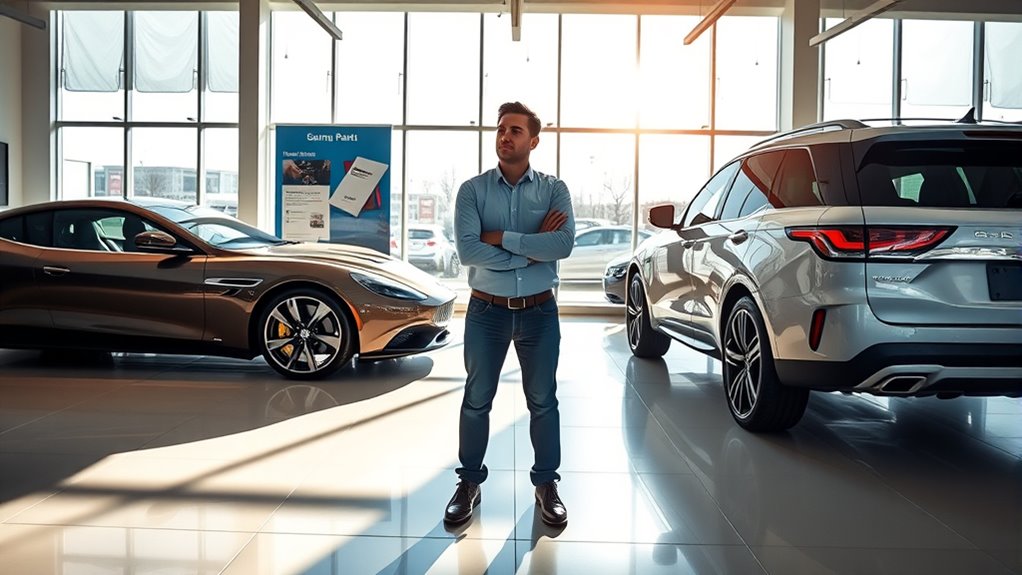When choosing between leasing and buying a car, think about your financial situation, driving habits, and lifestyle. Leasing often means lower payments and access to the latest models, but you’ll have mileage limits and no ownership. Buying a car gives you ownership and freedom to customize, making it great for long-term use. Evaluating your needs will help you make the best choice. Stick around to uncover key factors that can influence your decision further.
Key Takeaways
- Assess your financial situation: leasing requires lower upfront costs, while buying leads to long-term ownership without ongoing payments.
- Consider your driving habits: leasing may not suit high-mileage drivers due to mileage limits, making buying a better option.
- Evaluate your desire for new technology: leasing allows access to the latest models, while buying offers customization and personalization.
- Factor in maintenance costs: leased vehicles usually come with warranties, while owning a car may lead to higher long-term maintenance expenses.
- Align your choice with lifestyle goals: leasing suits those wanting flexibility and frequent upgrades, while buying fits those seeking commitment and ownership.

When you’re deciding whether to lease or buy a car, it’s essential to weigh your options carefully. Each choice has its pros and cons, and understanding them can save you time and money in the long run. Leasing typically requires a lower upfront payment and lower monthly payments than buying. This can be appealing, especially if you want to drive a new car every few years without the burden of a significant financial commitment.
Leasing allows you to enjoy the latest technology and features without dealing with depreciation. When the lease term is up, you simply return the car and can choose another model. This flexibility can be great if you like to keep up with automotive trends. Plus, many leases come with warranties that cover maintenance, which means fewer out-of-pocket expenses for you.
Leasing offers the latest features and flexibility, allowing you to drive a new car while minimizing maintenance costs.
On the flip side, buying a car means you’ll own it outright once it’s paid off. This can be a huge advantage if you plan to keep the vehicle for a long time. You won’t have to worry about mileage limits or excessive wear-and-tear fees, which can be sticking points with leases. When you own a car, you can customize it however you like, giving you the freedom to make it truly yours.
Another factor to consider is total cost. While leasing may seem cheaper in the short term, buying can save you money over time if you keep the car for several years. You’ll eventually stop making payments, while leased vehicles require ongoing payments every few years. Think about how long you plan to keep the car, as this can greatly influence your decision.
Additionally, consider your driving habits. If you drive a lot, leasing might not be ideal since most leases have mileage limits. Exceeding these can lead to costly penalties. If you’re someone who enjoys long road trips or has a lengthy daily commute, buying might be the better route.
Ultimately, your decision should reflect your financial situation, lifestyle, and preferences. Take the time to analyze your needs and do the math. Whether you choose to lease or buy, make sure it aligns with your personal and financial goals. A well-informed decision can lead to years of satisfaction on the road. For example, assessing your total cost can provide clarity on which option is more beneficial in the long run.
Frequently Asked Questions
What Are the Tax Implications of Leasing Versus Buying a Car?
When you lease a car, you can often deduct lease payments as a business expense if you use it for work. However, buying a car lets you claim depreciation and interest deductions, which can be beneficial if you’re financing. Keep in mind, tax benefits vary based on your situation and local laws. It’s smart to consult a tax professional to understand how each option affects your tax liability.
Can I Negotiate the Terms of a Lease?
Picture sitting across from a dealer, the air thick with anticipation. Yes, you can negotiate the terms of a lease! Just like haggling at a market, you have the power to discuss monthly payments, mileage limits, and even the down payment. Don’t hesitate to ask for better terms that suit your needs. Bring your research, stay confident, and remember, it’s all about getting a deal that feels right for you.
How Does Mileage Affect Leasing Options?
Mileage considerably affects your leasing options. Most leases come with a mileage limit, usually between 10,000 to 15,000 miles per year. If you exceed this limit, you’ll face hefty penalties. When you’re negotiating your lease, consider your driving habits. If you drive a lot, you might want to opt for a higher mileage allowance upfront. This way, you can avoid unexpected costs and enjoy your ride without worrying about exceeding limits.
What Happens if I Want to End My Lease Early?
If you want to end your lease early, you’ll typically face early termination fees. These can be significant, often involving the remaining payments plus a penalty. You can also consider transferring your lease to someone else, which might save you from fees. Contact your leasing company to explore your options; they’ll provide specific details on how to proceed and any financial implications involved. It’s essential to understand your lease agreement before making a decision.
Are There Any Hidden Fees in Leasing Contracts?
Yes, there can be hidden fees in leasing contracts. Often, you’ll find charges for excess mileage, wear and tear, or early termination. It’s essential to read the fine print and ask your dealer about all potential fees before signing. You might believe you’re getting a great deal, but those costs can add up quickly. Being aware of these fees helps you make a more informed decision and avoid surprises later on.
Conclusion
When it comes to choosing between leasing and buying a car, think of it like deciding between a cozy rental and a forever home. Leasing lets you enjoy the latest models without long-term commitment, while buying gives you the freedom to roam without restrictions. Ultimately, it’s about what fits your lifestyle best. So, weigh your options carefully; whether you’re planting roots or just passing through, make sure your wheels match your journey.









